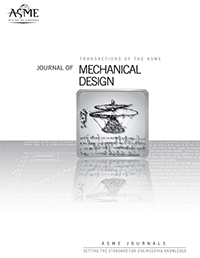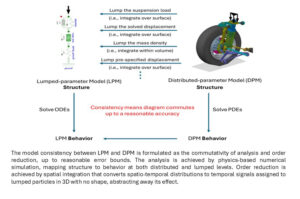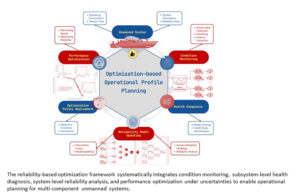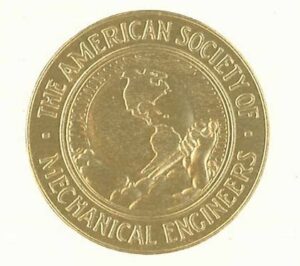
Call for Papers Data-Driven Design under Uncertainty
Recent technological advancements in hardware and software have transformed the

Recent technological advancements in hardware and software have transformed the

A major challenge in engineering analysis and design is to maintain consistency across models of the same engineered system at multiple levels of abstraction. For example, mechanical assemblies are commonly modeled at system-level (e.g., lumped-parameter networks of components) and component-level (3D models with detailed geometry and materials), whose comparison is nontrivial due to different representations and semantics. We present a novel, simulation-free approach to quantify consistency across a subset of such models; namely, linear time-invariant mass-spring-damper networks and corresponding elastic 3D objects deforming under mechanical loads. Their behavior is described by a finite vector of temporal signals, governed by systems of ordinary differential equations (ODEs), and spatio-temporal fields, governed by partial differential equations (PDEs), respectively. A major benefit of our approach is its ability to perform a priori consistency analysis rapidly (e.g., 5x faster than a posteriori comparison after solving ODEs and PDEs for state space dimensions larger than 30,000) even as the model complexity increases (e.g., only 2.2x slower when the number of equations is doubled). Our approach is validated through several mechanical design analyses, demonstrating its effectiveness in bridging the gap between different modeling abstractions and facilitating the integration between system-level and geometric designs.

Unmanned systems have gained immense popularity due to their ability to carry out complex operations without human intervention. Imagine a ship that can dynamically adjust engine conditions to get just a little bit farther on its remaining fuel – spelling the difference between mission success and heading back to port early – that is the goal for these complex systems. The operation of these systems is heavily dependent on many of their subsystems and components that need to work together reliably. This article contributes to a new and general framework for operational planning of unmanned systems. Embedded in the framework are several techniques such as deep learning for predicting subsystem health state, dynamic Bayesian networks for system reliability analysis, and multi-objective optimization for reliability-based design of operational profiles. An application of the framework is demonstrated with a case study in engine cooling and control system for an unmanned surface vessel. For this case study, the operational profiles along a trade-off frontier are obtained while expected vessel speed and system reliability are maximized for the vessel mission.
Click on the link below to read entire article
A Reliability-Based Optimization Framework for Planning Operational Profiles for Unmanned Systems | J. Mech. Des. | ASME Digital Collection

This special issue features selected papers from the 2023 International Design Engineering Technical Conferences.
A recording is now available for the Journal of Mechanical Design (JMD) and the Journal of Manufacturing Science and Engineering (JMSE) webinar based on their February 2024 Joint Special Issues: Advances in Design and Manufacturing for Sustainability.

The Editor and Editorial Board of the Journal of Mechanical Design would like to thank all of the reviewers for volunteering their expertise and time reviewing manuscripts in 2023. Serving as reviewers for the journal is a critical service necessary to maintain the quality of our publication and to provide the authors with a valuable peer review of their work.
This collection of articles explores emerging topics in traditional areas of design theory and methods research. The articles fall into three primary categories: (1) enhanced communication via design artifacts, (2) technology-enabled design artifacts, and (3) collaborative design platforms that enable collective creation.
This special issue is a joint effort between the ASME Manufacturing Engineering Division (MED) and the Design Engineering Division (DED) as part of a collaboration to advance design and manufacturing research in sustainability.

A recording is now available for JMD’s 10th Thematic Session on the topic of Topology Optimization, featuring talks by Satya R.T. Peddada, Levent Burak Kara, Faez Ahmed, and Qian Ye.

The Journal of Mechanical Design is pleased to announce the two (2) winners for the Journal of Mechanical Design 2022 Editors’ Choice Paper Award and one (1) Honorable Mention.

© 2021 Copyright Journal of Mechanical Design. All Rights Reserved. Privacy Policy